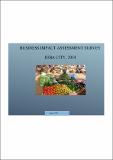| dc.description.abstract | The Business Impact Assessment Survey (BIAS) 2014 was first of its kind due to current political situation in the country, the South Sudan Business Forum felt that Business activities were not going as usual and they approached the National Bureau of Statistics to have snapshot survey so as to paint the picture of the situation.
The BIAS 2014 collected Information on demographic profile of the businesses, the economic characteristics of the population and its activity status at the business level. The main objective of the survey was to collect data related high quality and timely data on shock businesses, costs recoveries, business activities affected by the conflict. The SSBS 2010 comprised of four modules namely the Socio-economic; Labor force participation (employment) shocks, stocks, costs conflict and financial availability modules.
This report presents the major findings based on the businesses module of the South Sudan Business Survey 2010 (SSBS 2010) and some specific Modules design to fit the current turmoil in the country that affected the businesses during the December 15 2013 and after, which was intention of the Business of Impact Assessment survey. It shows the levels of different indicators and wherever possible, their respective trends over time. Indicators on Business characteristics, shocks, costs, conflict, security and businesses participation rates among others have been presented at different Payams in
Juba City. The Survey covered the three Payams of Juba City namely: Juba Town, Kator and Munuki.
While this report presents the key findings of 2010 and 2014, a lot more can still be studied from the data.
The National Bureau of Statistics would like to encourage stakeholders to utilize this rich data set that exists at the NBS to do more detailed analyses so as to inform further the policy debate. It is my hope that the findings will contribute to the knowledge based and assist stakeholders in planning and in policy formulation.
I am most grateful to the South Sudan Business Forum and the World Bank for the financial assistance that enabled the survey to take place. I acknowledge the NBS Team for their technical contribution during the data processing and analysis phases of the survey. I would also like to express my gratitude to all the field staff who worked hard to successfully implement the survey. Finally, I am grateful to the survey respondents who generously provided the information on which this report is based. | en_US |

